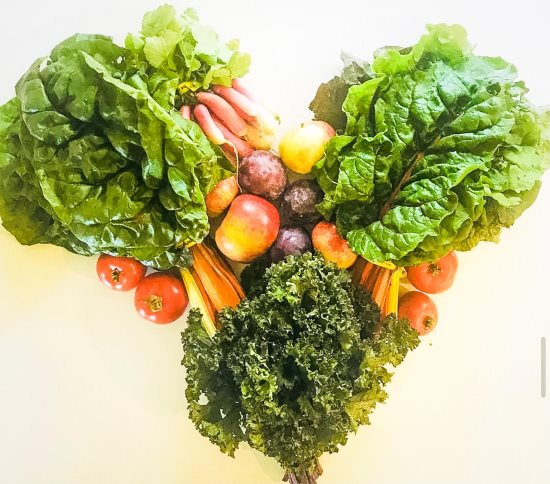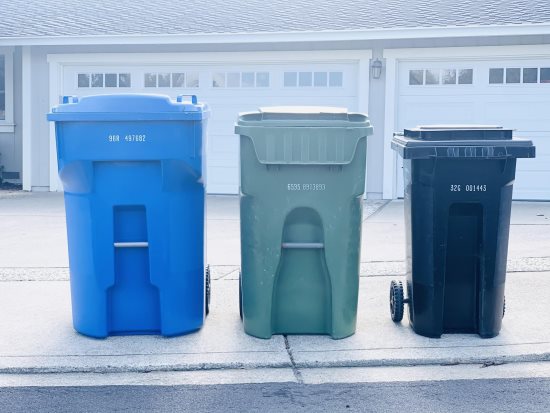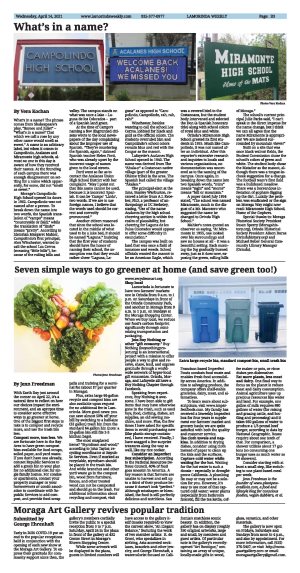| | Published April 14th, 2021
| Seven simple ways to go greener at home (and save green too!)
| | | By Jenn Freedman |  | | Photos Jenn Freedman |
With Earth Day just around the corner on April 22, it's a natural time to reflect on how our choices impact the environment, and an apropos time to consider some effective ways to go greener at home. One of the biggest first steps to take is to compost and recycle more, and use the trash bin less.
 Compost more, toss less. We are fortunate here in the Bay Area to have green compost bins available for food scraps, soiled paper, and yard waste. If you don't have one already, contact Republic Services to add a green bin to your plan for no additional cost for single family homes. For condos or apartments, contact your property manager or your homeowners or condo association to coordinate with Republic Services to add compost, and provide food scrap pails and training for a nominal fee (about $7 per quarter in Moraga).
Compost more, toss less. We are fortunate here in the Bay Area to have green compost bins available for food scraps, soiled paper, and yard waste. If you don't have one already, contact Republic Services to add a green bin to your plan for no additional cost for single family homes. For condos or apartments, contact your property manager or your homeowners or condo association to coordinate with Republic Services to add compost, and provide food scrap pails and training for a nominal fee (about $7 per quarter in Moraga).
 Plus, extra large 96-gallon recycle and compost bins are also available upon request for no additional fee in Lamorinda. More good news: you can save almost 50% off your bill by switching to a half-size (32 gallon) trash bin from the standard 64 gallon bin (note: a 32-gallon bin still fits 2-3 kitchen bags).
Plus, extra large 96-gallon recycle and compost bins are also available upon request for no additional fee in Lamorinda. More good news: you can save almost 50% off your bill by switching to a half-size (32 gallon) trash bin from the standard 64 gallon bin (note: a 32-gallon bin still fits 2-3 kitchen bags).
 The most misplaced items? "Styrofoam and wood," according to John Taylor, recycling coordinator at Republic Services. Even if marked as recyclable, styrofoam should be placed in the trash bin. And while branches and other yard waste go in the compost bin, wood from furniture, fences, and other treated wood can not be composted and should go in the trash. For additional information about recycling and compost, visit www.recyclesmart.org.
The most misplaced items? "Styrofoam and wood," according to John Taylor, recycling coordinator at Republic Services. Even if marked as recyclable, styrofoam should be placed in the trash bin. And while branches and other yard waste go in the compost bin, wood from furniture, fences, and other treated wood can not be composted and should go in the trash. For additional information about recycling and compost, visit www.recyclesmart.org.
 Shop local
Shop local
 Lamorinda is fortunate to have two farmers' markets: one in Orinda from 9 a.m. to 1 p.m. on Saturdays in front of the Orinda Community Park, and another in Moraga from 9 a.m. to 1 p.m. on Sundays at the Moraga Shopping Center. When we buy local, we reduce our food's carbon footprint significantly through minimizing transportation and packaging.
Lamorinda is fortunate to have two farmers' markets: one in Orinda from 9 a.m. to 1 p.m. on Saturdays in front of the Orinda Community Park, and another in Moraga from 9 a.m. to 1 p.m. on Sundays at the Moraga Shopping Center. When we buy local, we reduce our food's carbon footprint significantly through minimizing transportation and packaging.
 Join Buy Nothing or other "gift economy." Buy Nothing (buynothingproject.org) is an international project with a mission to offer people a way to give and receive, share, lend, and express gratitude through a worldwide network of hyper-local gift economies. Orinda, Moraga, and Lafayette all have a Buy Nothing Chapter through Facebook.
Join Buy Nothing or other "gift economy." Buy Nothing (buynothingproject.org) is an international project with a mission to offer people a way to give and receive, share, lend, and express gratitude through a worldwide network of hyper-local gift economies. Orinda, Moraga, and Lafayette all have a Buy Nothing Chapter through Facebook.
 Speaking from experience, Buy Nothing is awesome. I have been able to gift items that may have otherwise gone in the trash, such as used toys, food, clothing, dishes, art supplies, an old sewing machine, and more. Plus, the few times I have asked for specific items to avoid purchasing new (like plastic storage containers), I have received. Finally, I have snagged a few surprise treasures along the way as well, like my rice cooker.
Speaking from experience, Buy Nothing is awesome. I have been able to gift items that may have otherwise gone in the trash, such as used toys, food, clothing, dishes, art supplies, an old sewing machine, and more. Plus, the few times I have asked for specific items to avoid purchasing new (like plastic storage containers), I have received. Finally, I have snagged a few surprise treasures along the way as well, like my rice cooker.
 Consider an Imperfect Box subscription. According to the National Resources Defense Council, 40% of food goes uneaten in America. A key reason is that farmers are unable to harvest and sell up to a third of their produce because it doesn't look "perfect." Although misshapen or blemished, the food is still perfectly delicious and nutritious. San Francisco-based Imperfect Foods combats food waste and enables fresh food accessibility across America. In addition to salvaging produce, the company offers shelf-stable groceries, dairy, meat, and alternatives.
Consider an Imperfect Box subscription. According to the National Resources Defense Council, 40% of food goes uneaten in America. A key reason is that farmers are unable to harvest and sell up to a third of their produce because it doesn't look "perfect." Although misshapen or blemished, the food is still perfectly delicious and nutritious. San Francisco-based Imperfect Foods combats food waste and enables fresh food accessibility across America. In addition to salvaging produce, the company offers shelf-stable groceries, dairy, meat, and alternatives.
 To learn more about subscriptions, visit www.imperfectfoods.com. My family has received a biweekly Imperfect box for four years to supplement our farmers' market and grocery hauls; we are quite satisfied with both the quality and customer service.
To learn more about subscriptions, visit www.imperfectfoods.com. My family has received a biweekly Imperfect box for four years to supplement our farmers' market and grocery hauls; we are quite satisfied with both the quality and customer service.
 Use cloth towels and napkins. In addition to drying dishes, consider using cloth instead of paper to clean up the kids and the surfaces.
Use cloth towels and napkins. In addition to drying dishes, consider using cloth instead of paper to clean up the kids and the surfaces.
 Capture cold water while waiting for the hot. Waiting for the hot water is such a doozie - especially in drought-prone California. A plumbing fix may or may not be a solution for you. However, it's easy to use most of that captured cold water: water plants (especially from bathroom faucets), fill the tea kettle, coffee maker or pots, or rinse dishes pre-dishwasher.
Capture cold water while waiting for the hot. Waiting for the hot water is such a doozie - especially in drought-prone California. A plumbing fix may or may not be a solution for you. However, it's easy to use most of that captured cold water: water plants (especially from bathroom faucets), fill the tea kettle, coffee maker or pots, or rinse dishes pre-dishwasher.
 Eat more plants, less meat and dairy. One final way to focus on the planet is reduce meat and dairy consumption. Animal agriculture uses up precious resources like water and land. For example, one gallon of milk requires 880 gallons of water (for raising and grazing cattle, and bottling and processing) and it takes 660 gallons of water to produce a 1/3-pound beef burger, according to data by National Geographic. Beans require about one tenth of that. For comparison, a shower utilizes about 17 gallons (so consuming one burger uses as much water as 39 showers).
Eat more plants, less meat and dairy. One final way to focus on the planet is reduce meat and dairy consumption. Animal agriculture uses up precious resources like water and land. For example, one gallon of milk requires 880 gallons of water (for raising and grazing cattle, and bottling and processing) and it takes 660 gallons of water to produce a 1/3-pound beef burger, according to data by National Geographic. Beans require about one tenth of that. For comparison, a shower utilizes about 17 gallons (so consuming one burger uses as much water as 39 showers).
 Consider starting with at least a small step, like switching to one plant-based meal per week.
Consider starting with at least a small step, like switching to one plant-based meal per week.
 Jenn Freedman is the founder of www.plantpoweredlivin.com, a food and lifestyle blog for conscious foodies, vegan dabblers, et al.
Jenn Freedman is the founder of www.plantpoweredlivin.com, a food and lifestyle blog for conscious foodies, vegan dabblers, et al. |
 | | Extra large recycle bin, standard compost bin, small trash bin Photos Jenn Freedman | | | | | | | | | | | |




